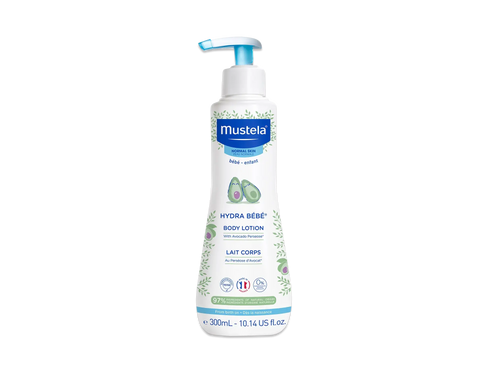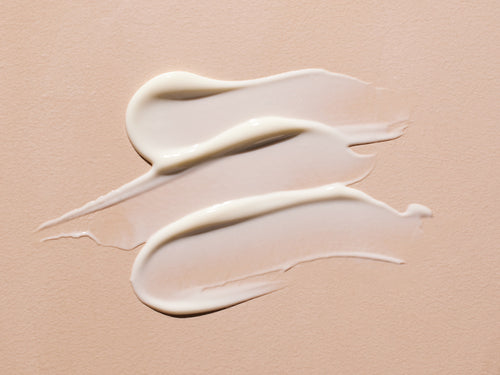Your little one is already 16 weeks old! It might be hard to believe, as it probably feels like your 4 month old baby was born just a few days ago. Time flies, especially when you’re sleep deprived.
While you’ve certainly become an expert at most baby-care tasks, like giving your little one a bath and changing dirty diapers, you may have a few questions about your 4 month old baby’s development. Babies grow up fast, and sometimes it’s difficult to know what’s normal.
One minute, they’re just a few inches tall, sleeping around 16 to 18 hours a day, and can hardly see you from afar. And then, suddenly, they’re sleeping fewer hours, nursing more, and are fast outgrowing their newborn clothing.
With all these new developments, you want to ensure that your baby is growing at a healthy rate. That’s what the baby experts at Mustela are here for!
In this post, we will explain all the facts about your 4 month old baby’s development, senses, motor skills, eating schedule, sleeping habits, and immunizations. Then we’ll close with some general childcare tips and a few potential warning signs to be aware of.

Caring For Your 4 Month Old Baby
In four short months, your little bundle of joy has almost doubled in weight and has become far more active during waking hours. Now, your 4 month old baby can babble, squirm, kick, and grab.
Let’s have a look at all the major aspects of your baby’s growth.
Your 4 Month Old Baby’s Development
Whereas holding your baby used to be easy, it may be a bit of a workout at the four-month mark. Your child has been growing at an incredible rate for the last 120 days.
On average, four-month-old girls weigh 13 pounds (5.9 kg) to 15.2 pounds (6.9 kg) and are 23.8 inches (60.5 cm) to 25 inches (63.5 cm) in height. Baby boys are a bit bigger at four months of age, weighing between 14.2 pounds (6.45 kg) and 16.5 pounds (7.5 kg), on average, and ranging in height from around 24.6 inches (62.5 cm) to 25.7 inches (65.2 cm).
What happens if your little one isn’t hitting these numbers perfectly?
Bear in mind that these figures represent the median 50 percent of babies. It’s definitely not problematic if your baby is bigger or smaller than the numbers we’ve mentioned. Just like adults, babies vary greatly in height and weight.
Your baby’s weight may also be influenced by lots of different factors, including how heavy they were at birth, how much they nurse, their genes, and whether or not they’re formula feeding.
A great way you can keep track of your little one’s physical growth is through their growth chart. Since birth, your baby’s physician has been recording their length, weight, and head size during each visit. This helps them ensure that your baby is growing at a healthy rate.
If you haven’t already, ask the physician to show you the chart. By now, you should see a growth curve developing.
So, even if your baby might be a little under or over the average weight and height, as long as they continue to grow along this curve at a healthy rate, there’s nothing to worry about!
Your 4 Month Old Baby’s Senses
When your baby was first born, their senses were very basic. Now, your little one’s senses have developed quite a bit and they are far more alert.
Sight
Your 4 month old baby can see clearly up to 12 feet away. This means they’ll be able to recognize familiar faces at more of a distance. They can distinguish between similar colors and can also tell the difference between shapes.
Also, you’ll notice that your little one no longer gets cross-eyed while focusing on different objects, something that may have happened a lot when they were younger.
You can help stimulate your baby’s vision further by giving them a change of scenery. Introducing new and colorful toys or going outside for a walk will help your little one continue to explore and learn the wonderful world around them.
Hearing
Your 4 month old baby’s hearing is developing quickly. This is great news because hearing is a crucial part of learning to talk!
When your baby was younger, they understood the tone of your voice. For instance, if they were crying and you spoke to them in a soothing voice, this could help them stop crying.
As your little one’s hearing continues to develop, they will soon be able to recognize and respond when you call out their name.
Taste
Since your baby is still consuming only breastmilk or baby formula, their sense of taste has not developed much yet.
Smell
Your 4 month old baby’s sense of smell is developing every day. The older they get the more they will understand the differences in various scents.
Right now, they may turn toward smells they find pleasant and turn away from odors they don’t like.
Touch
Finally, your baby’s sense of touch is becoming more advanced as they gain the ability to hold objects. You’ll notice your baby developing a sense of curiosity because they’ll try to touch everything in sight.
This would be a great time to introduce toys with different textures during playtime. Whether they’re squishy, smooth, or fluffy, your little one will enjoy touching and feeling them.
While you’re at it, don’t forget to be careful with your hair and jewelry, as your little one may try to swipe at these things.
Your 4 Month Old Baby’s Skill Development

Motor Skills
It’s amazing how quickly motor skills develop in the first several months of a child’s life. Your 4 month old baby may have developed a number of motor skills by now, including the ability to:
- Support their head while being held or while in a seated position
- Lift their head and shoulders off the ground while lying on their belly
- Grasp and hold small objects with their hands
- Kick their legs and push their feet down when held just off the ground
- Roll from their tummy to their back and vice versa
- Bring their fists or other objects they’re holding to their mouth
It’s important to note that not all babies will reach their milestones at the four-month mark. So if your baby hasn’t yet rolled from their tummy to their back, for example, it’s nothing to be worried about.
Just give your little one plenty of tummy time and they’ll be rolling and crawling before you know it.
Language Skills
While your little one still can’t say words, they can certainly make sounds. You’re probably hearing plenty of basic consonant and vowel sounds, such as “bah,” “muh,” and “doo.”
All this baby babble means that your 4 month old baby’s first words are coming soon!
You can talk to your baby often to help their communication skills develop. They may not understand everything you’re saying, but they are beginning to learn how verbal communication works.
If your baby makes noises, respond as if you understand and are having a real conversation.
Your 4 Month Old Baby’s Feeding Schedule

Around four months of age, your baby is probably feeding less often than in previous months. This is because your little one’s stomach has grown bigger, allowing them to consume more during each feeding.
However, your 4 month old baby still needs to feed every four hours or so. If you’re breastfeeding, your little one may need to eat more frequently than if you’re formula-feeding. Breastfed babies can be hungry as often as every three hours.
This is perfectly normal. Simply feed your little one until they seem content. If you’re giving your baby formula, they will need around four ounces every four or five hours.
This is perfectly normal. Simply feed your little one until they seem content. If you’re giving your baby formula, they will need around four ounces every four or five hours.
It’s important to note that these are general guidelines. In addition to paying attention to when you feed them, don’t be afraid to use your instincts to help you determine whether or not your baby is hungry.
You can do this by looking for cues that they might express to you. Are they fussy, licking their lips, sticking their tongue out, or continuously sucking on their knuckles? These are some common cues for a hungry baby.
Many parents wonder whether solid food is OK for a four month old. Medical professionals suggest waiting until the six-month mark to introduce solids to your baby’s diet.
But what about water? Surely it’s time to introduce them to some H2O?
Well, the same is true for water — your 4 month old baby doesn’t need water yet. Breastmilk or baby formula provides all the nutrients and hydration your little one needs.
Your 4 Month Old Baby’s Sleeping Habits
By the time your baby reaches four months of age, they are probably sleeping well through the night. Most 4 month old babies will sleep seven to eight hours in a row at night. This gives you the chance to get some much-needed rest!
Infants will often sleep a total of 10 hours at night, with one major wakeup for a snack or diaper change.
In addition to the 10 hours slept at night, your baby likely sleeps another four to five hours during the day. This is usually in the form of two naps, one in the morning and one in the afternoon. In total, your 4 month old baby should sleep about 15 hours per day.
Does this not sound anything like your baby’s sleeping habits? Again, we’d like to stress the importance of not worrying too much about hitting any particular numbers. These are just averages and should be a general guideline.
If sleeping has been a challenge for your baby, there are some measures you can take to help improve the situation. For example, consider investing in a white noise machine, which can improve your little’s quality of sleep.
These machines cancel out any disturbing or disruptive noises that may come from another room in the house (if you have older children, you know what we’re talking about!) or outside (if you live by a busy intersection or road).
Your little one can also get fussy and struggle to sleep when their room is too hot or if their clothing is uncomfortable. If this is the case, adjust the thermostat and let them sleep in loose and comfortable clothing.
Your 4 Month Old Baby’s Immunizations
At four months of age, your little one should have already received several immunization shots.
This includes two rounds of Hepatitis B vaccine as well as one round of Polio vaccine (IPV), Rotavirus vaccine (RV), Diphtheria, tetanus, and acellular pertussis vaccine (DTaP), Haemophilus influenzae type B vaccine (HIB), and Pneumococcal conjugate vaccine (PCV).
If your 4 month old baby isn’t up to date on their vaccinations, schedule an appointment with your doctor ASAP. It’s best to get caught up now before your little one gets too far behind on their immunizations.
If your baby is current on their shots, then at four months they’ll be ready for a second round of:
- Rotavirus vaccine (RV)
- Diphtheria, tetanus, and acellular pertussis vaccine (DTaP)
- Haemophilus influenzae type B vaccine (HIB)
- Pneumococcal conjugate vaccine (PCV)
Immunizations are extremely important for your baby’s health, so do your best to stay on schedule.
General Childcare Tips
Playtime

The older your little one gets, the more playtime they will be able to enjoy. The best thing about playtime at this stage is that it’s not all fun and games. The more your little one plays the more physical, mental, and social development they’ll get!
So, while it might be time-consuming, make sure to set aside just a few minutes a day to help your little one continue to grow and develop.
Here are some fun games you can play with your baby:
Follow A Moving Object
Your little one recently developed the ability to follow an object from side to side. But this movement might still be a little jerky and not completely fluid.
To help them continue to grow this skill, grab a colorful ball and slowly move it from one side to the other. They won’t be able to resist following along!
Reflection From A Mirror
To help your baby’s vision continue developing, let your little one play with an unbreakable crib mirror. Seeing the different colors, shapes, and even their own reflection from the mirror will be fascinating for them and fun for you to watch!
Sing To Your Baby
Since music is excellent to help boost your little one’s social and cognitive skills, this is a great time to start singing to your baby all the fun nursery rhymes (if you haven’t been already).
While singing, remember to use hand and body gestures, as well as animated facial expressions, to help instantly grab your baby’s attention.
Try to repeat the rhymes often as this will help your little one remember the tune, and when they start talking later, they’ll know the words, too!
Safety Measures
Below are some important baby safety tips that you should always keep in mind.
- Never leave your baby unattended, not even for a moment
- Keep small objects out of your baby’s reach, as they will try to put everything in their mouth and small objects present a serious choking hazard
- Babyproof your home to make sure your child’s environment is safe
- Always put your baby down to sleep on their back, never on their tummy.
Skin Care
Skin care is something many people can easily overlook. However, your baby has soft, delicate skin, so it’s essential to use safe skincare products.
Mustela offers a wide variety of baby-friendly products made from natural ingredients, like cleansers and shampoos, oils, and hydrating creams and lotions.
Skin conditions like baby acne, eczema, and cradle cap are most prevalent around four months, so using gentle, safe skincare products is of the utmost importance.

When To Be Concerned
If you regularly read our blog, you’ll know that we often highlight the importance of understanding that your baby will follow their own growth and development.
While it’s essential to avoid comparing your child to other children because each child is unique, you need to also be aware of signs of a developmental delay.
Your 4 month old baby may have a developmental delay if they:
- Do not smile or laugh
- Are unable to support the weight of their own head
- Do not recognize you and your partner by sight
- Don’t respond to loud noises
- Seem unable to track close objects with their eyes
- Don’t hold eye contact with you when you’re in close proximity
Caring For Yourself
As a parent of a 4 month old baby, there’s a good chance you haven’t thought much about yourself over the past few months. And if you have older children, then it’s probably been longer than that!
We get it. Our children mean everything to us!
While it’s important to ensure that your little one is safe and healthy, it’s just as important to look after yourself. Remember that the healthier and happier you are, the easier you’ll find it to look after your little one.
Sleep
It’s challenging to sleep enough hours when you’re a parent to a baby who needs your attention all the time, but you still need to rest.
So, the best solution here is to ask for help. Discuss this with your partner and see if you can reach an agreement where you both get the rest you need.
In addition, close family and friends already love your little one and, most of the time, won’t mind babysitting for a few hours.
Eat And Drink Well
A balanced diet will help you fuel your body and mind. While it’s challenging to always have the right amount of nutrients, try consuming a variety of fruits and vegetables each day. In addition, drink plenty of water to keep you hydrated.
Taking care of yourself is essential. In addition to eating well and drinking plenty of water, get some exercise in with a simple brisk walk a few times a week.
Lastly, if you’re breastfeeding, use Mustela’s Nursing Comfort Balm to help soothe and protect your nipples.
Final Thoughts On Caring For Your 4 Month Old Baby

Your 4 month old baby is hitting incredible milestones. This is an exciting time for them (and for you)!
Continue taking good care of your little one and in the process, remember to use baby-safe products with natural ingredients, like Mustela’s Diaper Cream With Olive Oil And Aloe that is both organic and fragrance-free.
Sometimes taking care of your little one can be challenging. On those days, remember to give yourself a break. You’re doing an amazing job!
To learn more about the interesting developments your little one will go through, check out our blog!

















